| |
|
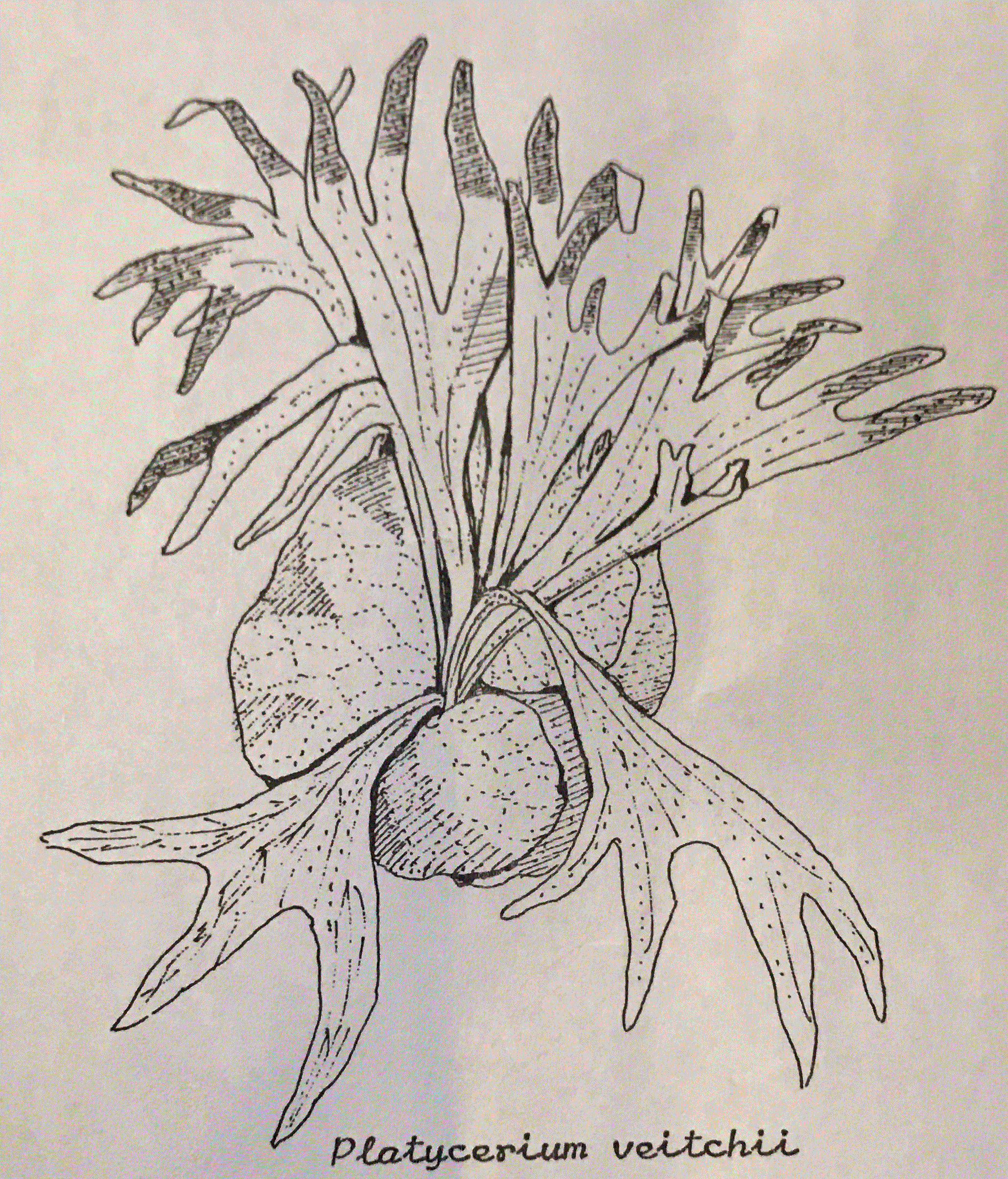 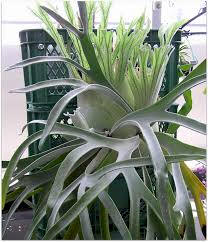
Platycerium Veitchii
|
The Platycerium veitchii is probably named for the Veitch nursery in
Exeter England, founded by James Veitch in the late 18th century and
run by the family until it closed in 1914.P.
veitchii, common name Silver Elkhorn is from Australia and is closely
related to P. biforcatum, but is unique in several ways. It is
covered with a great amount of white hair. The tops of the
shield fronds grow into tall thin fingers. Its fertile fronds are
very upright. You can see in the photo above the tall fingers on
the shield fronds
Roy Vail suggests these traits are adaptations to
the dry conditions where it is native. It likes very high light
levels for these traits to be fully shown. If the light is less,
the fertile fronds are less erect, have fewer hairs, and the fingers
along the tops of the shield fronds are shorter. Roy ail has
documented a Platycerium veitchii cv Lemoinei growing in low light
that has long slender fertile fronds with no spore patches.
After the fronds mature, they can not support their own weight and
droop down. That same plant 18 months later has very erect
fertile fronds with spore patches after it was moved into a high light
environment.
In its native habitat, the P. veitchii is seen
growing on rocks, near springs, in semi-arid basins in eastern
Australia. It withstands droughts of several months.
P. veitchii cv Lemoinei is sometimes offered in the trade as
"green veitchii". When compared to a regular P.
veitchii the fertile fronds are much greener. The true P. veitchii is almost identical to
the cultivar Lemoinei, but the Lemoinei is greener than the true P.
veichii.
There are several different cultivars of P. veitchi.
The most common is shown in photographs on this page. There is
another P. veitchii with very stiff and very narrow fertile fronds
that form wide hands at the tip. There is another with fronds
that look like a P. hillii. Both these grow in the wild in
Australia. There is also a cross between P. hillii and P. veitchii
that grows round shield fronds without the typical P. veitchii
tall
finger shield fronds. |
|
|
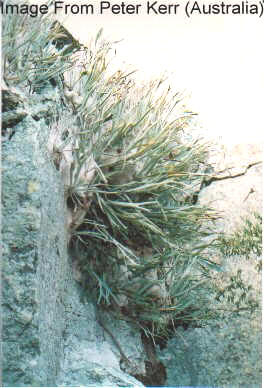
Platycerium veitchii growing on the side of a rock
face in eastern Australia where the annual rainfall is quite low,
about 25 inches a year.. Over watering can give P. veitchii
difficulties, but it is an easy, interesting, distinctive and rugged
species which forms pups freely.
One of the goals of most hobbyists growing P. viethii is obtaining
the true color of P. veitchii which is from the white hair on the
fertile fronds. Second they want vertical fertile fronds.
High light, with little moisture gives the most distinctive specimens. |
|
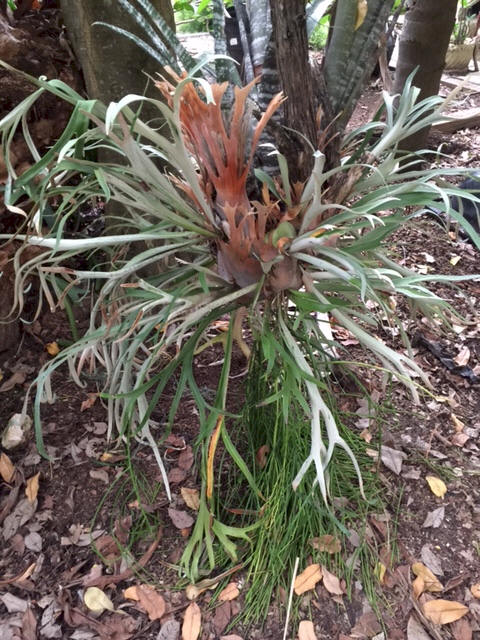
An interesting P. veichii submitted by Denise in Florida.
Notice the color difference between the brown shield fronds and the
silver fertile fronds. The fertile fronds are very narrow as
compared to the wider version pictured above.
From the photo, it appears this P. veitchii is growing under low light
conditions. The long slender fertile fronds that can not stay
upright point this out. It is suspected a closer look might find
few spore patches because of the poor light. These babies need
lots of light to reflect their true character of white erect fertile
fronds with lots of spore patches. |
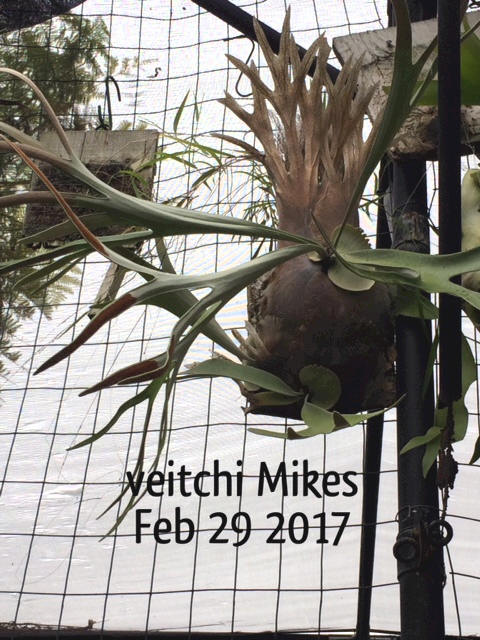
This P. veitchii is growing in Mike Moody's garden. Mike was
President of LAIFS for 5 years and is still very active.
This beauty has long slender fertile fronds with wide forked
fingers. The shield fronds show very deep lobbing. It is
not growing in enough sunlight to develop its true silver color prized
by collectors.
|
|
|
|
|
|
P. veitchii Mt Stewart is
a new cultivar Roy Vail has suggested I should look for while touring
Thailand in 2016. (I never found one) |
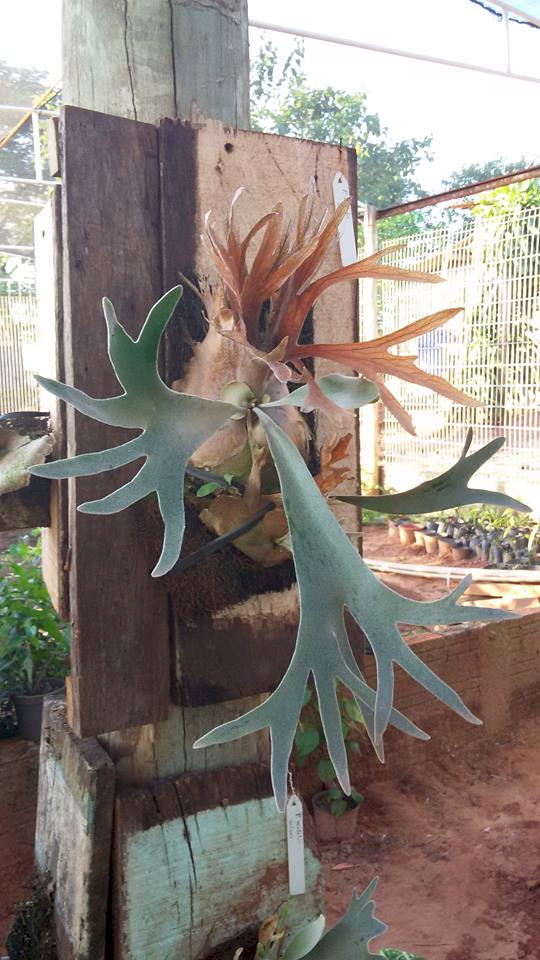
I found this photo on Facebook and posted by Adenilson
Arneiro, probably in Brazil. It is a Platycerium, veitchii cv 'Lemoinei"
Notice the number of forks on the fertile fronds. Also notice
the tips of the shield fronds. Very impressive. I would
love to have a volunteer from this plant. The Lemoinei is also
called a green veitchii because it does not have the silver color of a
true veitchii and is green as shown in this photo. |
|
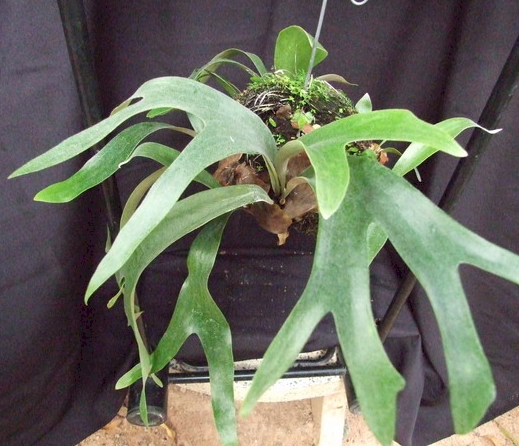 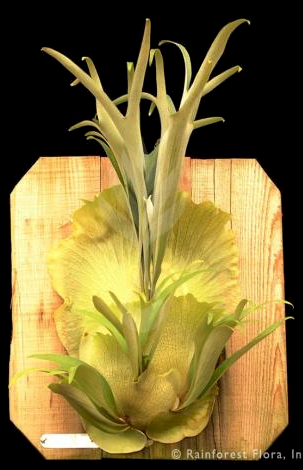
Another Hybrid. P. veitchii cv "Japanese Hybrid"
This P. veitchii cv "Japanese Hybrid" pictured left on Siam Exotica
is different from the P. veitchii cv "Japanese Hybrid" pictured on
Rainforest, pictured right. The width of the fertile fronds are
different, the shield frond appears different, and the color is
different. |
There are a couple of new P. veitchii's from Thailand. There
is not much known about these cultivars but we list them here
waiting for more information. |
|
 |
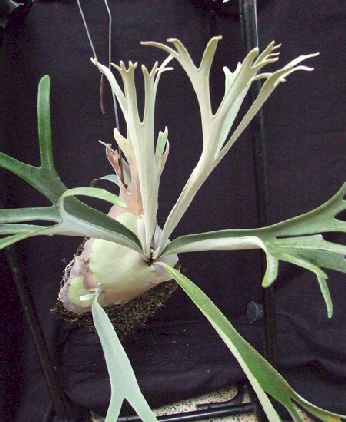 |
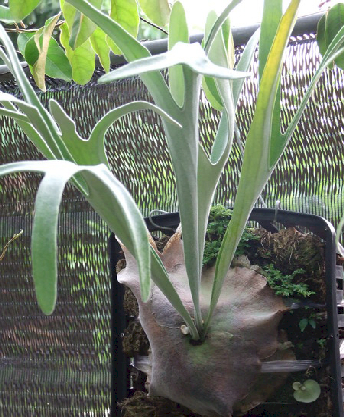 |
| P. veitchii 'Green' |
P. veitchii 'Pumilum' |
P. veitchii 'Silver Frond' |
|
| P. veitchii 'Mt Stuart'
Found this photo (right) on Barry Landau's Facebook page Planet
Platycerium. It was labeled P veitchii (Mt Stuart form).
The grower, Trevor Crawford thought it was an extinct form but
he found a grower with a large one and got this pup. I
believe they are in Queensland in NE Australia. The
Facebook post, and I assume the photo, was posted in March 2019.
I have recently learned there is a nursery in Sydney that sells
the Mt Stuart.
I really like this form because it has beautiful silver gray
color and very wide fertile fronds, like a P. hillii. The silver
gray color is a result of a full sun growing environment. |
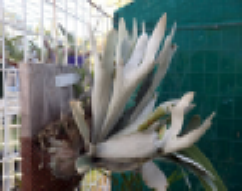
Click Click on photo to enlarge |
|
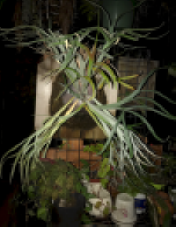
I picked up this beauty at Rainforest Flora in
Hawthorne. They had it labeled as something else and was over
priced, but I had to have in in my collection. you can click
on photo to enlarge. |
|
|
|
|
|
[ Plant Glossary ]
Return to main page |